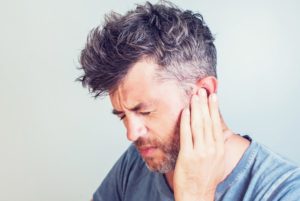
Tinnitus is one of the conditions Dr. Volpi treats at New York ENT. Here’s some information about what can be a maddening condition.
What is tinnitus?
Tinnitus is characterized by the person hearing a ringing or roaring in their ears. It cannot be heard by others, so sometimes these sounds are deemed to be “phantom noises.” Tinnitus can occur in one or both ears. About one in five people have at least some degree of tinnitus. In some of those people, the ringing or other sound can become so loud it interferes with the person’s ability to concentrate.
These are the sounds that can be heard with tinnitus:
- Ringing
- Buzzing
- Roaring
- Clicking
- Hissing
Different sounds for different causes
When you come see us at our Central Park or Park Avenue locations, Dr. Volpi will ask you the type of sounds you are hearing, as these can point to an underlying cause.
- High-pitched ringing — If you’ve attended a loud rock concert or were working with loud machinery such as a chainsaw, this can cause ringing or buzzing that usually goes away in a few hours. The same is true after a blow to the ear, say in a basketball game. However, if there is hearing loss, the tinnitus may be permanent. Long-term exposure to noise, age-related hearing loss, and certain medications can all cause this high-pitched ringing in both ears.
- Low-pitched ringing — Conditions such as Meniere’s disease can cause low-pitched ringing in just one ear. If you have vertigo, your tinnitus can become very loud right before an attack.
- Rushing or humming — These sounds are usually related to vascular causes, such as when you exercise. They can also occur when you lie down or stand up relatively quickly.
- Clicking — Muscle contractions in and around your ear can cause sharp clicking sounds that you hear in bursts. These can be just a few seconds or can last a few minutes.
- Heartbeat — Blood vessel problems, such as high blood pressure, an aneurysm or tumor, or an issue with your Eustachian tube can amplify the sound of your heartbeat in your ears.
Do you have constant ringing or other noise in your ears? That sounds like tinnitus. If it’s beginning to impinge on your concentration, it’s time to come see Dr. Volpi at New York ENT. Call us at 212-873-6036 to schedule an appointment.



